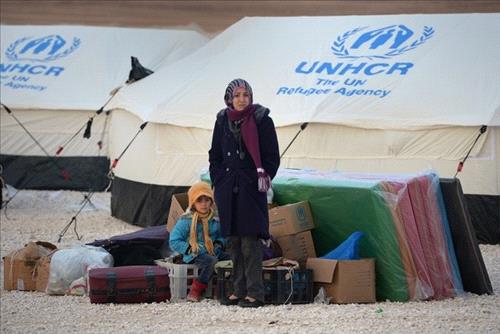Ammon News - AMMONNEWS - in an interview with the BBC, Lieutenant General Mahmoud Freihat, Jordan’s chairman of the joint chiefs of staff, spoke about Jordan’s neighbours, ISIL’s presence in southern Syria and its threat to Jordanian national security, as well as the group’s surface-to-air missile capabilities. Lt Gen Freihat also remarked on the geopolitical landscape in Iraq and Syria, and what Syrian president Bashar Al Assad’s next military option was likely to be.
"Since the beginning of the crisis, we haven’t operated against the regime at all, our relations with the regime have remained, and our diplomatic relations with Syria have also remained," he said. "Our objective is to fight terrorism anywhere."
Crucially, Lt Gen Freihat noted that Jordan has remained in touch with the Syrian government despite his country’s anti-Assad position.
Driving the backchannel contacts was the status of the border and the refugee flows that have placed social and economic strain on Jordan. The message from Amman was clear: once the Syrian army re-establishes control of the border, Jordan will move to reopen it completely.
Less than a week after these remarks, Mohammed Al Momani, Jordan’s minister for information, echoed Lt Gen Freihat’s comments, stating Jordan had maintained diplomatic relations with Syria throughout the crisis and embassies in both countries remain open. Mr Al Momani noted that the Arab League had voted to suspend Syria’s membership and recall Arab ambassadors from Damascus, with Jordan voting in favour of the first motion, but abstaining from the latter.
Since the onset of the Arab Spring, Jordan has largely been cushioned against the turmoil affecting many other parts of the region. Although there were popular protests in 2011, they dissipated quickly.
Since then, Jordan has been primarily concerned with events in Syria and the potential spillover from the conflict.
The comments by the general and the minister are a far cry from Jordan’s position in the early stages of the Syrian conflict. At that time, Amman’s actions and statements seemed conspicuously anti-Assad, with King Abdullah the first to call for him to step down in November 2011.
Jordan supported the Southern Front, a rebel coalition comprising roughly 60 groups that operated in and around the southern Syrian cities of Daraa and Quneitra. Jordan’s backing for the Southern Front also included the establishment of the military operations centre in Amman. Along with the United States and Saudi Arabia, it provided weapons to rebels in the south, and paid their salaries.
Another indicator was the expulsion of Syria’s ambassador to the country, Bahjat Suleiman, in 2014, over his insults against Jordan’s Gulf allies and accusations that Amman was hosting radical opposition fighters.
However, the biggest signal that Jordan was opposed to Mr Al Assad was the training of anti-Assad rebels on Jordanian territory, a covert programme conceived by the CIA in 2013.
After Syrian government forces succeeded in recapturing rebel-held east Aleppo in December, the rebels are now facing total defeat at the hands of the government. Several countries across the region have subtly expressed their support for Mr Al Assad in recent months, and while Jordan has not openly backed the Syrian government, these comments by senior government officials demonstrate that the tide is turning and Jordan is recalibrating its position on the Syrian conflict.
Is Jordan ready and willing to normalise relations with the Syrian government? The comments of Lt Gen Freihat and Mr Al Momani suggest so.
Despite the rebel coalition refraining from taking action against Mr Al Assad’s troops in southern Syria – at Jordan’s behest, thereby safeguarding the country’s borders with Syria – full Syrian government control of the south would be even more desirable for Amman. This would guarantee Jordan’s border security and act as a precursor to the re-establishment of full relations.
Taken at face value, Lt Gen Freihat’s comment to the BBC imply that Jordanian military planners believe opening the border is inevitable once the Syrian army secures the area.
This suggests that Jordan is bracing itself for the eventual defeat of opposition forces and preparing to re-establish strong links with Mr Al Assad’s government.
Such a public shift would have profound implications for the Syrian conflict, as Amman has in the past refrained from expressing any sentiment that could be advantageous for, or even mildly supportive of, Mr Al Assad. Moreover, even the tacit acknowledgement of Mr Al Assad’s grip on power in Syria would signal a foreign policy pivot away from the stated positions of key Jordanian allies such as Saudi Arabia and the United States.
With Saudi Arabia heavily focused on the conflict in Yemen, and a new US president who has aligned himself at least rhetorically with Russia (and by extension is less anti-Assad than his predecessor), Amman is making a calculated gamble that there is an opening to put Jordanian national security interests at the centre of its foreign policy.
Emboldening Mr Al Assad, and by extension his benefactors in Tehran, runs the risk of creating new fault lines in the Sunni Arab world.
*The National








 comment replay
comment replay 